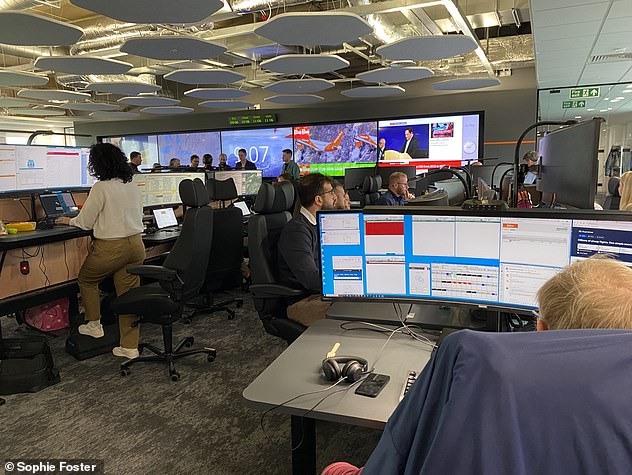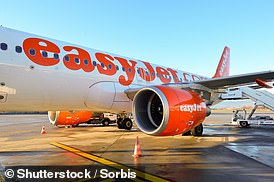Budget airline easyJet, which operates 1,950 flights a day in peak season, opened its new Integrated Control Center (ICC) this week, and we got a peek behind its doors.
Those inside manage 340 planes and make the big decisions about who to delay and which groups receive maximum protection from disruption, such as schoolchildren and easyJet Holiday passengers.
Managers also manage a complex staff agenda, which they reveal has become more difficult in the wake of Brexit regulations.
Additionally, we had the opportunity to try to manage an easyJet flight schedule, faced with a faulty plane that left a route out of service. It was not easy.
The new ICC is located just outside the Luton Airport precinct, so that if an incident occurs, such as last year’s car park fire, it can continue to operate.
The ICC (above) is made up of four “modules” (covering Gatwick, the rest of the UK, the EU and “the Swiss”), plus a senior team occupying a separate desk.
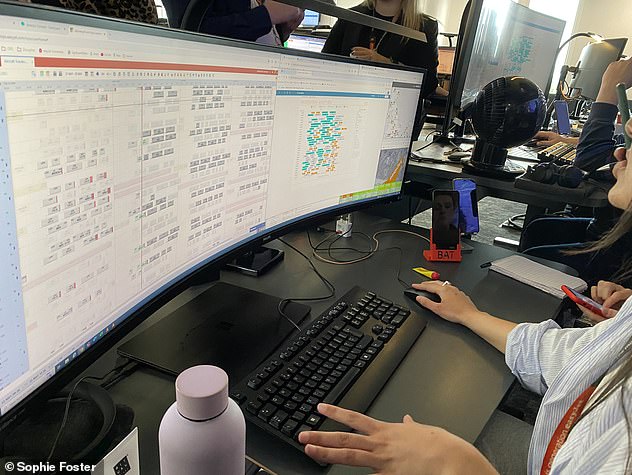
Aaishah, senior operations officer, is in charge of monitoring every flight that lands and takes off, as well as any disruptions that occur.
The building has countless new features, from dark desks to protect the night team’s view, individual lighting, huge screens and… much to their delight, windows (the previous office “looked like a casino,” according to Gill, Director of Network Control ).
The control center is divided into two: the Integrated Control Center (ICC) and the Maintenance Control Center (MCC).
The ICC is made up of four “modules” (covering Gatwick, the rest of the UK, the EU and “the Swiss”), plus a senior team occupying a separate desk.
Aaishah, senior operations officer, is in charge of monitoring every flight that lands and takes off, as well as any disruptions that occur.
“Truck drivers can only drive for a certain number of hours; the same goes for flight crew.”
Jen, Senior Crew Officer at easyJet
The weather can be a hurdle, but he revealed that easyJet has its own dedicated Met Office scientists on the end of a phone to tell you how long the inclement weather will last to help with this.
Aaishah also has to ensure that planes can reach maintenance hangars on time; even a canceled engine swap costs £10,000.
Next up was the crew team, where senior crew officers Jen and Adam balance the needs of around 15,000 crew members.
Around 22 per cent of all easyJet crew are on standby at any one time, waiting to replace sick or overworked staff.
Legal break times are one of the reasons why flights are delayed.
If a trip is delayed, the crew on board may need a longer rest period before flying again, meaning your next scheduled task will need a new crew.
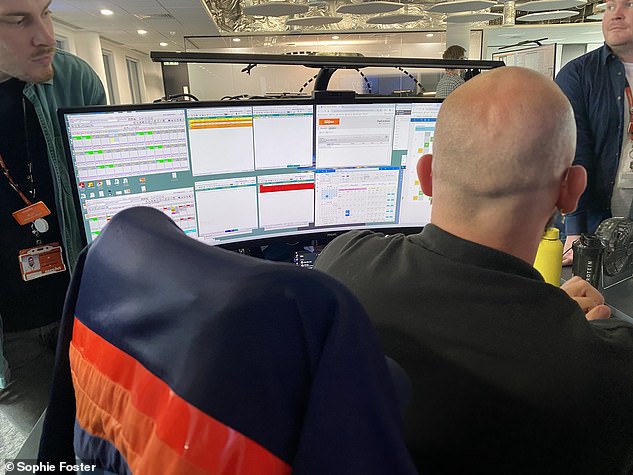
Senior Crew Officers Jen and Adam (seated above) balance the needs of around 15,000 crew members.
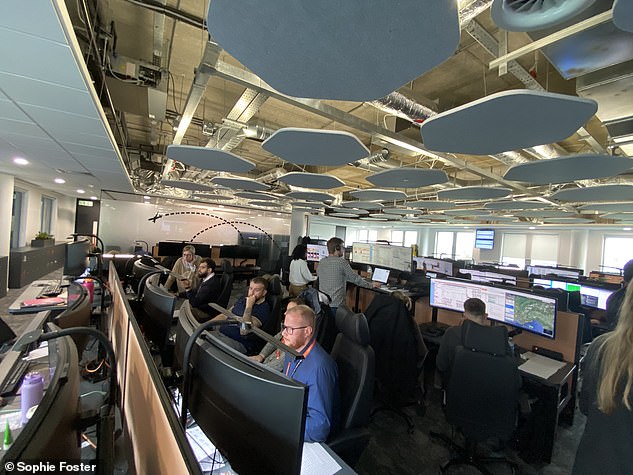
New high-tech systems have been integrated into the new ICC (above), including an artificial intelligence program designed by easyJet called ‘Jetstream’.
The team noted that all crew, from pilots to flight attendants, must live within 90 minutes of the airport to ensure they can get there in plenty of time.
Jen explained to MailOnline: “Truck drivers can only drive for a certain number of hours – the same goes for flight crew.”
Crew issues have become more complicated in the wake of Brexit, leading to more flight delays.
After Brexit, if a flight is registered in the EU it can only be crewed by EU staff, and easyJet cannot use any UK reserve crew to fill in the gaps. If all the EU reserve crew has been used up, the flight will be delayed.
Also at the ICC is the customer service team.
These are the people who choose which flights to delay or cancel, and who you fly with can decide whether you get to your destination on time.
A large, complicated screen using a program called a “disco” shows what flights are scheduled for the day, who is on board, and which flights need a new plane or a new crew.
Mark, senior customer director, said certain “special interest” groups are prioritized, including passengers with reduced mobility, easyJet holiday groups, repatriated passengers (i.e. people who have already experienced delays) and school travel groups.
The reason the latter are a priority is that school trips often do not have enough adults to supervise children overnight in a hotel booked by easyJet for those with canceled flights.
Other considerations when deciding to delay include the number of available hotel rooms and seats for the same destination within the next 48 hours.
New high-tech systems have been integrated into the new ICC, including an artificial intelligence program designed by easyJet called ‘Jetstream’.
This compiles information stored in eight large manuals into a single system, making the control room faster in making decisions.
Gill explained: “We’ve included thousands and thousands of pages from eight different manuals and now we can just ask it a question and it will give us an answer.”
Even crew will be able to use Jetstream to search for answers, rather than flooding the ICC with calls (they currently receive 35,000 crew calls each month).
The MCC makes up the other half of the complex, where 26 licensed engineers ensure each aircraft is safe to fly.
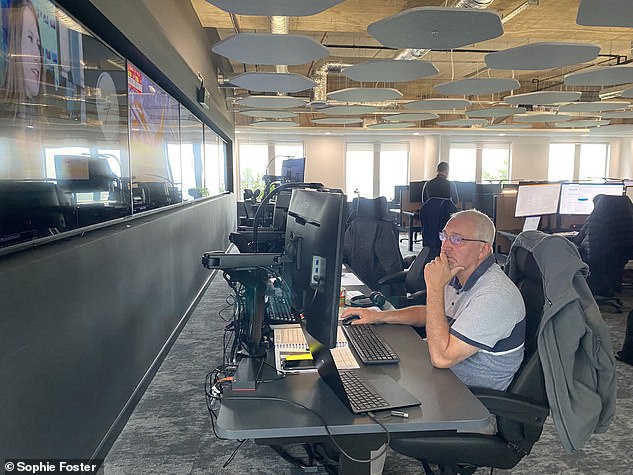
The Maintenance Control Center (MCC, above) will soon join the ICC in using AI, with a new system capable of pulling in past reports to cross-reference with current issues.
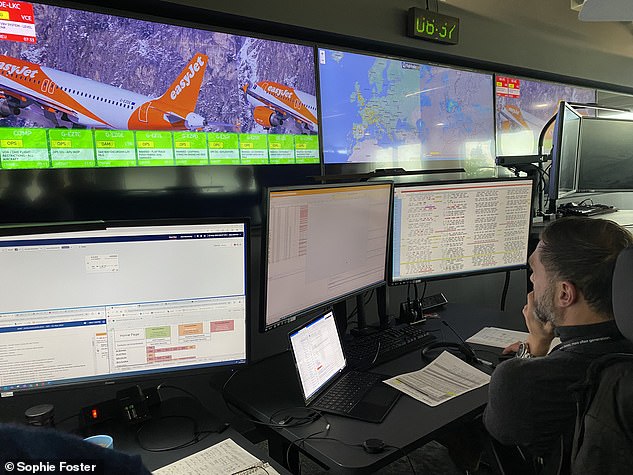
The MCC (above) makes up half of the complex, where 26 licensed engineers ensure each aircraft is safe to fly.
Jim, a maintenance operations manager and former Army helicopter engineer, oversees the 24-hour operation.
Their workload includes scheduling maintenance appointments at hangars in Luton, Gatwick, Berlin, Geneva and Milan and ensuring planes spend overnight maintenance every 750 cycles (flight hours).
The MCC will soon join the ICC in using AI, with a new system capable of extracting previous reports to cross-reference with ongoing issues.
Jim noted: ‘We are highly regulated; At the end of the day, the tool we are considering using will show you the source. You will observe the information around you and use your own learning. Then you use your own knowledge to make judgements.’
Those of us on the tour were not only able to look behind the scenes, but also participate in a “disruption game.”
They showed us a large board indicating the schedule for the day: flights that had departed, those scheduled to fly, the planes available and when they had to come in for maintenance or repair, along with the crew’s schedules and hours already worked.
The smiling ICC staff then informed us that we had a scenario to deal with: 40 schoolchildren were ready to board a flight at Milan Malpensa Airport bound for London Gatwick, but the plane was found to be faulty and a reserve plane of the EU that was ready to replace it is without a crew.
Unfortunately, there are no EU staff available to crew the flight, only British, which is useless after Brexit.
How would you arrange the schedule?
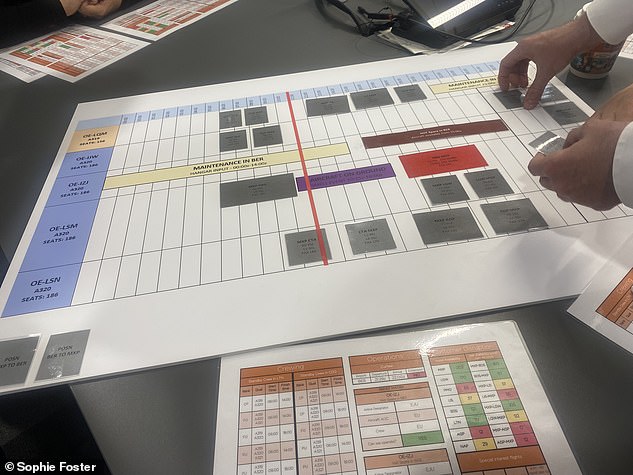
MailOnline Travel was involved in a ‘game of disruption’ – can we rework a schedule to fly 40 schoolchildren to London from Milan after their plane broke down?
In the end, my team decided, correctly, to delay domestic passengers scheduled to board two flights from Milan to Brindisi and instead use these planes and their crew to fly priority groups home to London.
The crew will then be able to return and work on delayed flights to Brindisi airport in southern Italy.
Since the delayed flights are short, domestic trips, the crew has time left in their legal work schedule to staff them, making sure everyone gets home that night.
I discovered how quickly delays can accumulate and spread to other travelers when all considerations are taken into account.
Maybe now I’ll complain less when I see the time change on the departure board.

